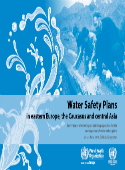Water safety plans in eastern Europe, the Caucasus and central Asia (2014)

Download
This publication provides a summary of the key outcomes of a workshop that the WHO Regional Office for Europe held on building capacities for the development of water safety plans (WSPs) on 24 and 25 June 2014 in Bishkek, Kyrgyzstan. The document covers background information on WSPs, highlights its key benefits, reviews countries’ experiences of WSPs in the WHO European Region and addresses the needs for creating an enabling environment for WSP uptake.
This workshop was intended to support the implementation of the 2014–2016 programme of work of the United Nations Economic Commission for Europe and WHO Protocol on Water and Health to the 1992 Convention on the Protection and Use of Transboundary Watercourses and International Lakes.
The primary purpose of the workshop was to increase understanding of and support for WSPs by raising awareness among national governments to the WSP approach, its benefits and the lessons learned. It also had a longer-term vision of building the foundations for a sustainable scale-up of WSP implementation in countries of eastern Europe, the Caucasus and central Asia (EECCA). A new WSP field guide in English and Russian was launched at the workshop; this provides hands-on advice for communities and local institutions working on rural water supplies.
The workshop was attended by 78 delegates from the water and health sectors, including participants from 12 EECCA countries and a broad range of international organizations and nongovernmental organizations.



